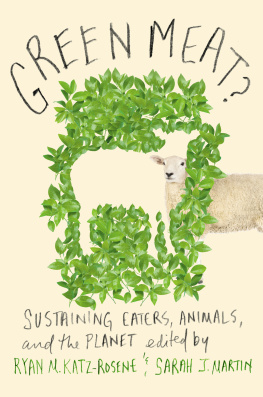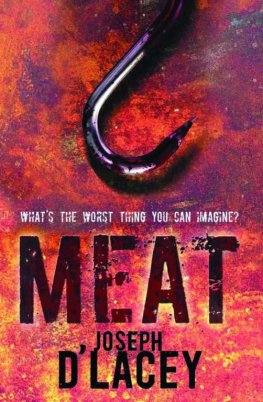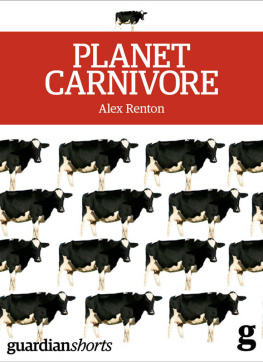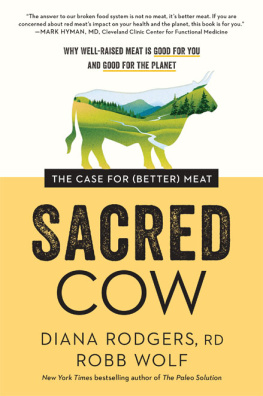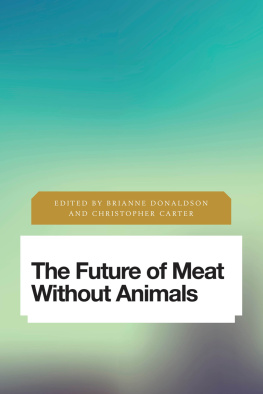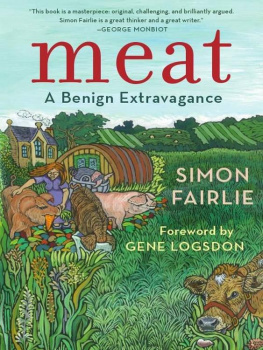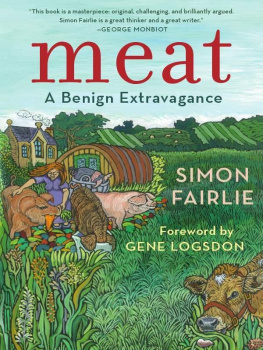
GREEN MEAT?
GREEN MEAT?
Sustaining Eaters, Animals, and the Planet
Edited by
Ryan M. Katz-Rosene and Sarah J. Martin
McGill-Queens University Press
Montreal & Kingston London Chicago
McGill-Queens University Press 2020
ISBN 978-0-2280-0133-1 (cloth)
ISBN 978-0-2280-0271-0 (ePDF)
ISBN 978-0-2280-0272-7 (ePUB)
Legal deposit second quarter 2020
Bibliothque nationale du Qubec
Printed in Canada on acid-free paper that is 100% ancient forest free
(100% post-consumer recycled), processed chlorine free
This book has been published with the help of a grant from the Canadian Federation for the Humanities and Social Sciences, through the Awards to Scholarly Publications Program, using funds provided by the Social Sciences and Humanities Research Council of Canada.

We acknowledge the support of the Canada Council for the Arts.
Nous remercions le Conseil des arts du Canada de son soutien.
Library and Archives Canada Cataloguing in Publication
Title: Green meat? : sustaining eaters, animals, and the planet / edited by Ryan M. Katz-Rosene and Sarah J. Martin.
Names: Katz-Rosene, Ryan, editor. | Martin, Sarah J., 1961- editor.
Description: Includes bibliographical references and index.
Identifiers: Canadiana (print) 20200155318 | Canadiana (ebook) 20200155385 | ISBN 9780228001331 (cloth) | ISBN 9780228002710 (ePDF) | ISBN 9780228002727 (ePUB)
Subjects: LCSH: Animal industryEnvironmental aspects. | LCSH: Meat industry and tradeEnvironmental aspects. | LCSH: Animal culture. | LCSH: Livestock. | LCSH: Sustainable agriculture.
Classification: LCC HD9410.5 .G74 2020 | DDC 338.1/76DC23
This book was designed and typeset by Peggy & Co. Design in 10.5/13 Sabon.
Ryan would like to dedicate this book to Fanny, a fine Jersey cow, who may or may not know how much shes contributed to his thinking on the relationship between animals, humans, and their shared environment.
Sarah would like to dedicate this book to all the students who have taught her so much.
Contents
Sarah J. Martin and Ryan M. Katz-Rosene
Tony Weis
Ryan M. Katz-Rosene
Caitlin M. Scott
Sheldon Frith
Shirley Thompson, Pepper Pritty, and Keshab Thapa
Alexandra Kenefick
Gwendolyn Blue
Lenore Newman
Abra Brynne
Ryan M. Katz-Rosene and Sarah J. Martin
Tables, Figures, and Maps
Tables
Figures
Maps
Preface
Ryan M. Katz-Rosene and Sarah J. Martin
Let us be clear from the outset: This book is not intended in any way as an apology for carefree meat consumption, nor is it intended as a condemnation of eating animals. For any hardline carnivores or vegans out there seeking to find material that bolsters their claims of superior dietary practices look elsewhere! If anything, our foremost intention as editors and that of our contributors is to reiterate the importance of thinking carefully about what you eat, where it comes from, and how it was produced. What are the impacts of your diet on you, your community/communities, and your planet? This critical thinking about food and diet is a responsibility that we believe we have as editors, who are part of a consumption-driven class of settlers in what is presently known as Canada, all while living in a particularly challenging epoch in terms of global environmental change and the social, political, and economic changes that come along with it.
From this starting point, however, each of the contributors to this volume travels in a different direction. Some of us have arrived at no-meat or low-meat diets after embarking upon this careful dietary calculus; others of us have been less concerned with the material presence of meat on our plates and more with the qualitative aspects of its production (which, in turn, usually has quantitative implications). In bringing together this variety of perspectives on what constitutes green meat, and in considering whether the practice of eco-carnivorism is even possible in the first place, we hope to provide fodder (sorry, this is the first of many puns, intended or otherwise, that result from a book themed around food and animal agriculture) for the various debating voices in your head as they reach a synthesis regarding dietary practices that work for you and your attempt to limit your dietary footprint.
As this book makes clear, the environmental impact of food production, and in particular meat production, is a very hot topic these days. As you will read in the ensuing chapters, a range of new agricultural practices, new agricultural thinkers and practitioners, and even new non-meat protein alternatives have emerged in recent years, raising the pitch of discussion around this subject. In preparing this book we have also noted considerable interest in the theme of meat-environment relations, dating back to some scholarly panels we held in 2016 at the annual meetings of the Environmental Studies Association of Canada, the Canadian Political Science Association, and the Canadian Association for the Study of Food panels which preceded this book and served as an early launch pad for some of our contributors to fine-tune their arguments. Those panels solicited considerable interest from the audience, and some heated (though respectful) debate. We mention this here in part to remind the reader that this book is part of a larger dialogue taking place in society, and it should be viewed not as an effort to portray a definitive theory of meat-environment relations, but rather a contributing partner in the broader canon on this complicated theme.
Acknowledgments
Of course, as the early panels we held suggest, this book has been a multi-year effort, and the result of numerous contributing minds. As such, we have many people to thank (though it goes without saying that these helpful individuals bear no responsibility for any of the books limitations for those you can thank us editors). In particular, we want to thank Jonathan Crago from McGill-Queens University Press, who was excited by this idea from the very start, along with Khadija Coxon and Kathleen Fraser of MQUP who guided us through this project thereafter, and Scott Howard, whose copyediting was world-class. We would also like to thank Christopher Kelly-Bisson, Laura OBrien, and Jose Augusto Costa for helping us enormously with editing, formatting, indexing, and all the other fun nuts and bolts of putting an edited collection together without them this project would have been delayed even further! Of course, we thank all of our contributors, not just to the present volume, but also those who contributed to the panel sessions we held, and all those who provided excellent questions and feedback at those early roundtable sessions. Last, but not least, we thank our friends and family for laying a foundation of support necessary for carrying out a long-term project of this nature.
PART ONE
PROBLEMATIZING THE PROBLEM
Introduction
Sarah J. Martin and Ryan M. Katz-Rosene
In recent years, it has seemingly become an irrefutable truth: The production of animals for meat is unsustainable. Land is being eroded and destroyed, water resources overdrawn, greenhouse gases over-emitted, and energy and grains unnecessarily diverted all to satiate a growing, unhealthy, and inequitable global pattern of meat overconsumption. For many concerned about this unsustainable relationship between meat and environment, the logical way to reduce ones ecological hoofprint is to dramatically reduce or reject the consumption of meat and animal-based products, as well as diets characterized by meatification (see Weis, ). Hence recent headlines from widely read media outlets warning of the ecological devastation associated with one of our speciess most common culinary practices the consumption of animal products: Eat less meat to avoid dangerous global warming, scientists say (Harvey 2016); Avoiding meat and dairy is single biggest way to reduce your impact on Earth (Carrington 2018); and perhaps most blunt of all, Meat is horrible (Premack 2016). As these headlines suggest, the notion that animal agriculture is one of the main culprits in the earths environmental predicament an argument further popularized in the recent documentary film
Next page
